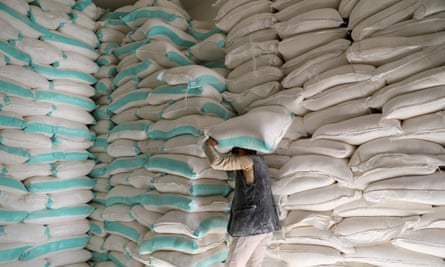At the close of 2019, 135 million people across 55 countries and territories experienced acute food insecurity, said the Global Network Against Food Crises.
Acute food insecurity is defined as when a person's inability to consume adequate food puts their lives or livelihoods in immediate danger.
"This is the highest level of acute food insecurity and malnutrition by the network since the first edition of the report in 2017," it noted.
More than half — 73 million — were in Africa, 43 million live in the Middle East and Asia, 18.5 million live in Latin America and the Caribbean. Europe was home to half a million food-insecure people.
A further 183 million people were also classified in a stressed condition or on the cusp of hunger and "at risk of slipping into crisis or worse if faced with a shock or stressor, such as the COVID-19 pandemic."
Conflict/insecurity was still the main driver of food crises last year, although weather extremes and economic shocks became increasingly important.
The report expected the acute food insecurity situation to get worse in 2020 even before the pandemic unleashed itself over the world, due in parts to damaging floods and a severe desert locust outbreak.
Food prices up, purchasing power down
The virus could further exacerbate the problem.
"The pandemic may well devastate livelihoods and food security, especially in fragile contexts and particularly for the most vulnerable people working in the informal agricultural and non-agricultural sectors," the report stated.
The pandemic and efforts to stem transmissions including lockdown measures will also impact the food supply chain.
"Harvests have been good and the 2020 outlook for stable crops is promising. However, movement restrictions necessary to contain the spread of the virus will disrupt the transport and processing of food and other critical goods, increasing delivery times and reducing the availability of even the most basic food items," it added.
Movement restrictions and illness may also limit the availability of agricultural labour which is likely to contribute to rising food prices at a time when households face a reduction in their purchasing power due to the recession and rising unemployment.
The International Monetary Fund predicted last week that global growth will shrink to -3 per cent this year with the global economy worse off than during the Great Depression of the 1930s.
No region will be spared. The US and Euro Area are expected to contract by 5.9 per cent and 7.5 per cent respectively. Sub-Saharan Africa is forecast to contract by -1.6 per cent, a downward revision of 5.2 percentage points compared to six months ago.
The IMF warned that the region is "facing an unprecedented health and economic crisis" that "threatens to reverse development progress of recent years".
More about: coronavirus food poverty
















































